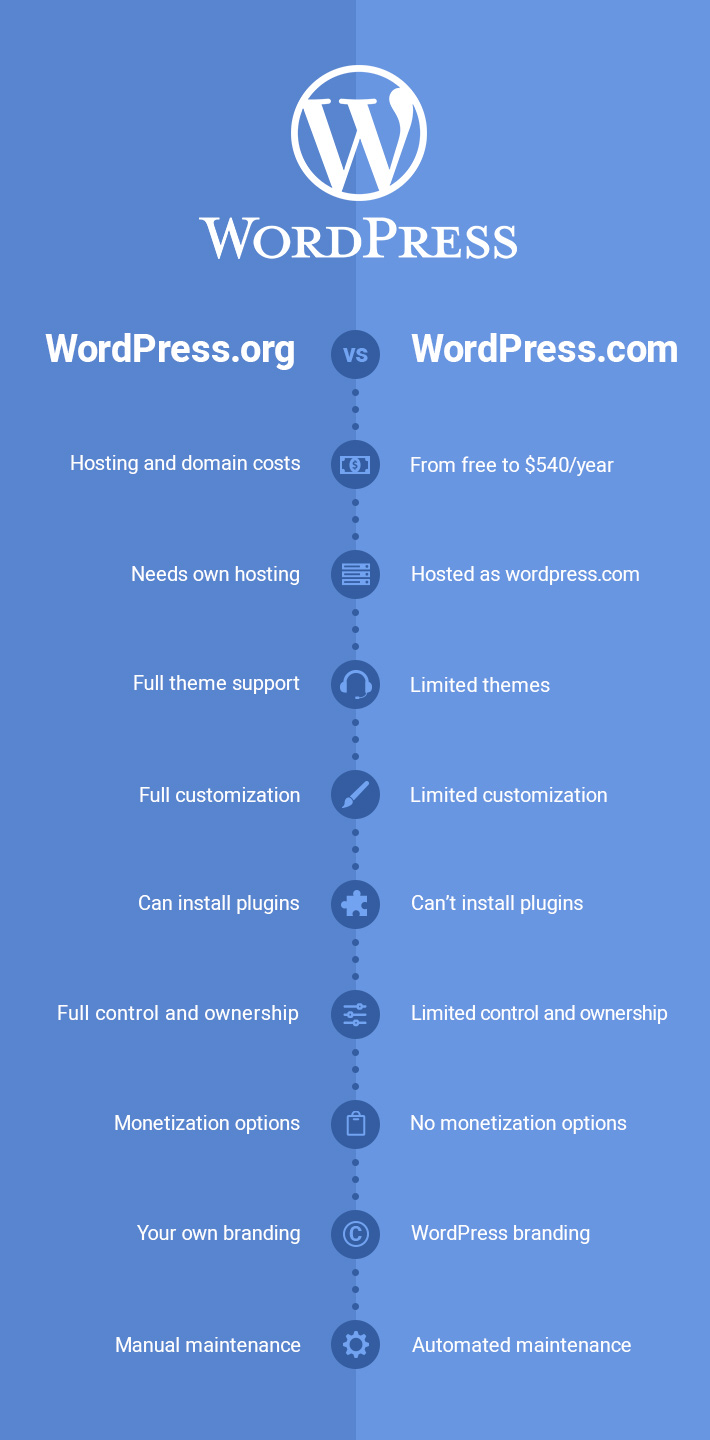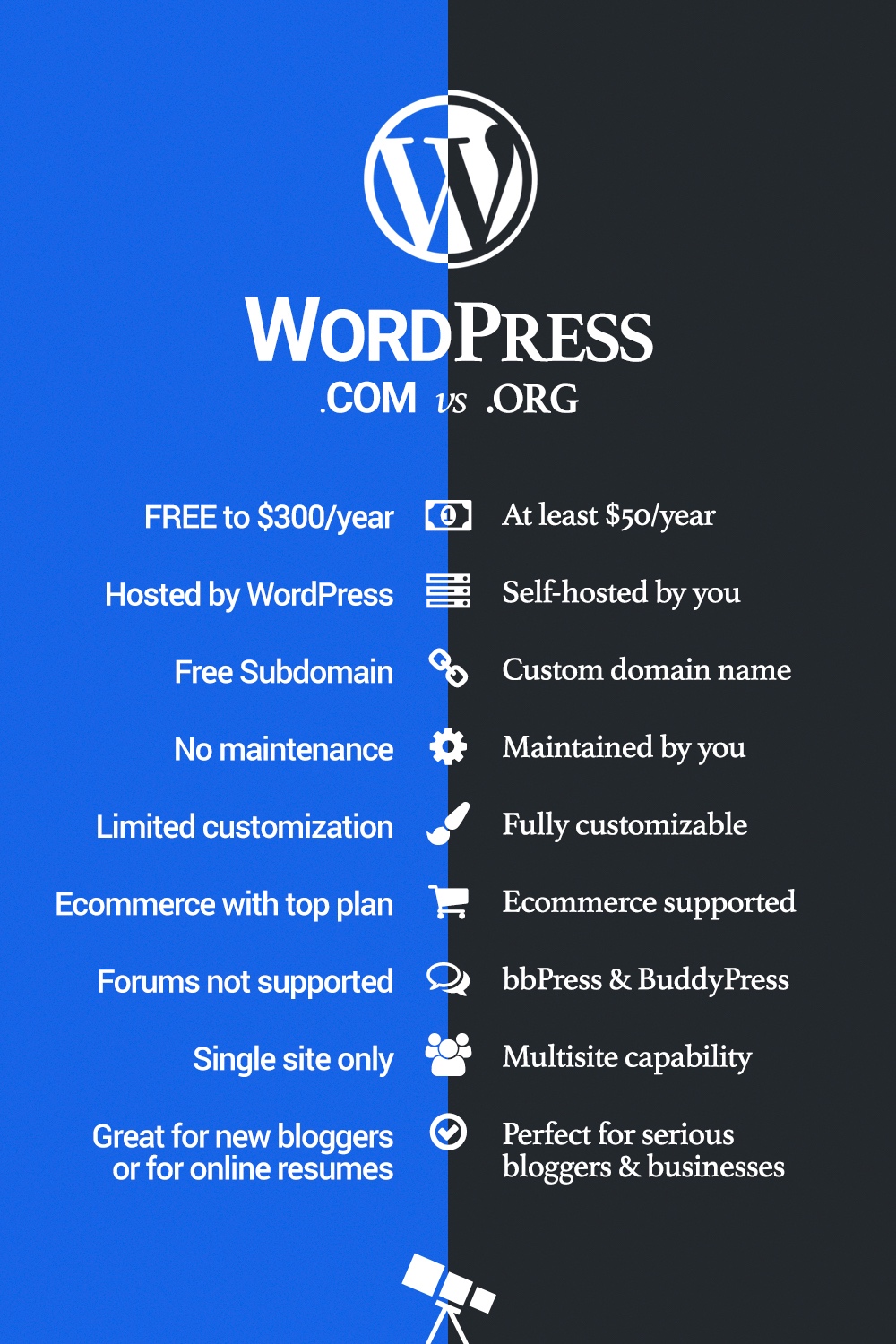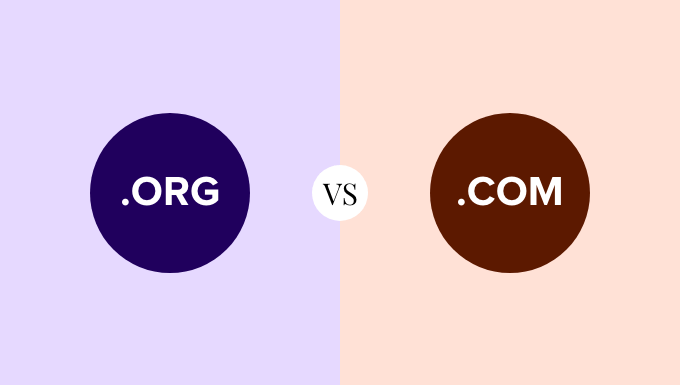.Com Vs .Org: Which Domain is Right for Your Website?
Choosing between a .com and a .org domain can be confusing. Both have their unique benefits and uses.
Comparing. com and. org domains helps you understand their differences. This comparison is crucial for anyone starting a website. A. com domain is often used for commercial sites. It is the most recognized domain extension. On the other hand,. org is commonly used by non-profits and organizations.
Knowing which domain suits your needs can impact your online presence. This guide will help you decide which domain extension is best for your website. Understanding these differences can save you time and effort. Let’s explore the key distinctions between. com and. org.

.com Overview
The .com domain is the most well-known top-level domain (TLD) on the internet. It stands for “commercial” and was originally intended for business-related websites. Today, it is used by a wide range of entities, including businesses, individuals, and organizations.
Popularity And Usage
The .com domain is extremely popular. It is often the first choice for businesses and individuals. According to recent data, over 150 million .com domains are registered.
The .com domain is versatile. It can be used for various purposes, such as:
- Company websites
- Personal blogs
- Online stores
- Portfolio sites
Pros And Cons
| Pros | Cons |
|---|---|
|
|
The .com domain is trusted. Users often prefer it because it feels safe and professional.
SEO benefits are significant. Google and other search engines tend to rank .com domains higher.
Competition is tough. Securing a good .com name can be challenging.
Costs can be higher. Premium .com domains can be expensive.
Many desirable names are already taken. Finding a unique name may require creativity.

.org Overview
The .org domain is one of the oldest and most trusted top-level domains (TLDs). It is often used by non-profit organizations, open-source projects, and communities. Established in 1985, .org stands for “organization” and has a reputation for credibility and reliability.
Purpose And Usage
The .org domain is primarily used by non-profit entities, charities, and community groups. It is also popular among open-source software projects, educational platforms, and social initiatives. Many people trust websites with a .org domain because they are often associated with philanthropic and educational causes.
Examples of .org usage:
- Non-profit organizations
- Open-source software projects
- Educational institutions
- Community initiatives
- Social movements
Pros And Cons
| Pros | Cons |
|---|---|
| Builds trust and credibility | Less common for commercial use |
| Ideal for non-profits and charities | May limit marketability |
| Recognized worldwide | Misconceptions about non-profit status |
The .org domain offers unique advantages. It builds trust, is ideal for non-profits, and is globally recognized. Yet, it is less common for commercial use and may limit marketability. There can also be misconceptions that all .org websites are non-profit.
Comparing .com And .org
When choosing a domain, two popular options are .com and .org. Both have unique benefits and cater to different needs. Understanding their differences helps you make the right choice.
Target Audience
The .com domain is widely used for commercial purposes. It suits businesses, e-commerce sites, and personal blogs. Its popularity makes it the first choice for many.
The .org domain is ideal for non-profit organizations, charities, and educational websites. It represents trust and community, making it perfect for these entities.
| Domain | Primary Use | Common Users |
|---|---|---|
| .com | Commercial | Businesses, E-commerce, Personal Blogs |
| .org | Non-profit | Charities, Educational Institutions, Communities |
Seo Impact
SEO plays a crucial role in your website’s success. Both .com and .org domains can rank well in search engines. The choice of domain does not directly affect rankings.
Search engines focus on content quality and relevance. They do not prioritize one domain extension over the other. Your domain choice should match your site’s purpose and audience.
Using a .com domain might give a slight edge due to its familiarity. Users often default to .com when typing a URL. This can lead to more direct traffic.
A .org domain builds trust with audiences looking for credible information. It is beneficial for establishing authority and trustworthiness.
- Both domains can rank well.
- Content quality is more important for SEO.
- .com may attract more direct traffic.
- .org builds trust and credibility.

Choosing The Right Domain
Choosing the right domain is crucial for your website’s success. A domain name impacts your brand’s visibility, credibility, and audience engagement. Understanding the differences between .com and .org can help you make an informed decision.
Business Goals
Your business goals play a significant role in selecting a domain. A .com domain suits commercial ventures. It is widely recognized and trusted. If your aim is profit, .com is often the best choice.
On the other hand, .org domains are ideal for organizations. Non-profits, charities, and educational institutions often use .org. This domain signals trust and community service. Your choice should align with your core objectives.
Audience Expectations
Understanding your audience’s expectations is essential. A .com domain meets the expectations of most users. People are familiar with .com and find it credible. It is the default choice for many internet users.
.org domains convey a different message. They suggest a focus on social good or education. If your audience values these aspects, .org might be better. Align the domain with what your visitors expect.
Case Studies
When choosing a domain extension, understanding the real-world impact is crucial. This section delves into case studies of successful sites. We will explore both .Com and .Org domains. These examples will help you see the practical differences.
Successful .com Sites
Many businesses use .Com domains. These sites often rank high in search results. For instance, Amazon.com is a global leader in online retail. It has a user-friendly interface and vast product range. Its .Com domain helps in gaining trust and recognition.
Another example is Google.com. It is the world’s top search engine. The .Com domain makes it easy to remember. This contributes to its massive daily user count. It is a prime example of a successful .Com site.
Successful .org Sites
Non-profit organizations prefer .Org domains. Wikipedia.org is a prime example. It offers free knowledge to millions. The .Org domain signals its non-commercial nature. This builds trust among users worldwide.
Another successful .Org site is RedCross.org. It provides emergency assistance and disaster relief. The .Org domain enhances its credibility. People are more likely to donate to a .Org site. This is due to its association with trustworthy organizations.
Future Trends
As the digital landscape evolves, so do the choices for domain extensions. Understanding future trends in .Com and .Org can help you make better decisions. This section explores the evolving domain landscape and emerging alternatives in the context of .Com vs .Org.
Evolving Domain Landscape
The domain landscape is changing rapidly. New technologies and trends are influencing these changes. .Com remains popular due to its familiarity. It’s often the first choice for businesses and individuals alike.
.Org, on the other hand, is preferred by non-profits and organizations. Its reputation for trustworthiness makes it a solid choice. As the internet grows, both .Com and .Org adapt to new demands. They provide secure and reliable options for various users.
Emerging Alternatives
New domain extensions are emerging as viable alternatives. Extensions like .io, .co, and .tech are gaining popularity. These alternatives offer more availability and often better branding opportunities.
Businesses and startups are considering these new options. They help to stand out in a crowded market. Despite this, .Com and .Org still hold strong positions. Their established reputation ensures they remain top choices for many users.
Frequently Asked Questions
What Is The Difference Between .com And .org?
. Com is for commercial websites. . Org is for non-profit organizations.
Which Is Better For A Business, .com Or .org?
. Com is better for businesses. It is more recognized and trusted by users.
Can I Use .org For A Personal Blog?
Yes, but. org is usually for non-profit or community-focused sites.
Is .com More Expensive Than .org?
Not necessarily. Prices depend on the domain registrar and available deals.
Do .org Websites Rank Better On Google?
Domain type does not affect ranking. Content quality and SEO practices do.
Are There Any Restrictions On .org Domains?
Generally, no. Anyone can register a. org domain. Originally, it was for non-profits.
Conclusion
Choosing between. com and. org depends on your website’s purpose. Both have unique strengths. A. com domain works best for businesses and commercial sites. A. org domain suits nonprofits and communities. Understanding these differences helps you make an informed decision.
Consider your audience and goals. Pick the right domain to match your needs. Make your website effective and engaging.






